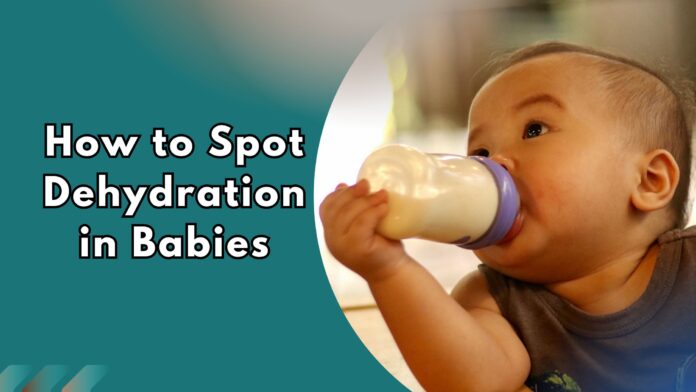Being a new parent is amazing, but it also comes with plenty of challenges. Between your baby crying in the middle of the night or those endless diaper runs that completely mess with your sleep, it can feel like you’re always running on empty. While most of these things are part of the parenting journey, there is one issue that should never be overlooked, and that is baby dehydration.
Let’s understand the causes of baby dehydration and how you can spot the signs of dehydration in babies early.
Note: This article by TheFitInside is for informational purposes and general knowledge only. It is not intended to replace professional medical advice, diagnosis, or treatment. Always consult a qualified doctor or healthcare professional if you have concerns about your baby’s health.
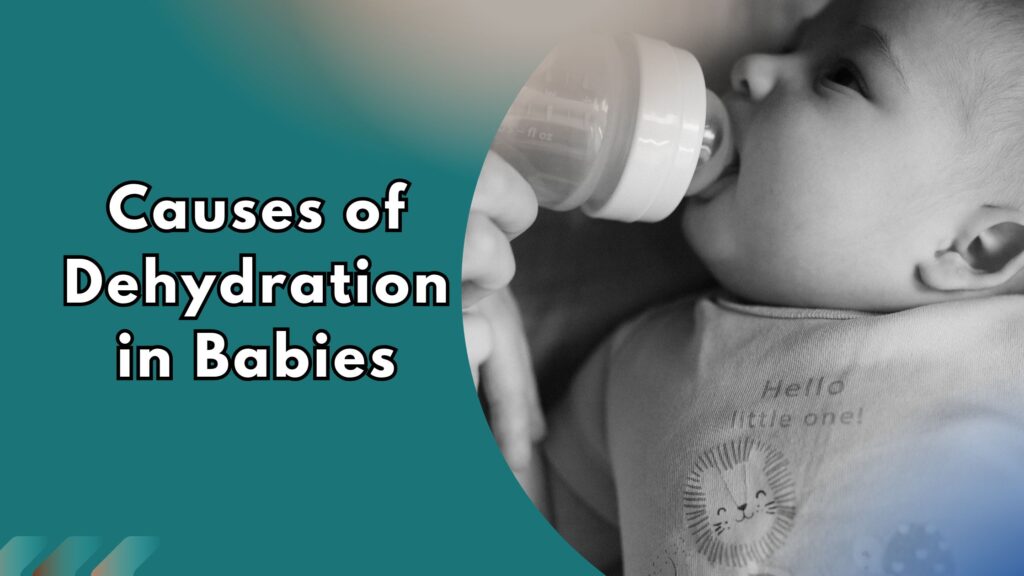
Causes of Dehydration in Babies
Infant dehydration symptoms can develop for several reasons, and because their bodies are so small, even a little fluid loss can have a big impact. Some of the most common causes of baby dehydration include:
- Frequent urination: Passing urine too often can drain your baby’s body of water faster than it can be replaced.
- Vomiting: Repeated throwing up takes away both fluids and essential salts, leaving your baby’s body unbalanced.
- Diarrhea: Watery stools can quickly drain your baby’s fluids, and the WHO confirms that it is one of the leading causes of severe dehydration in infants.
- Fever: When the body temperature goes up, babies sweat more and breathe faster, which both increase fluid loss.
- Inadequate feeding: Babies who are not feeding well, whether from poor latching, sleepiness, or illness, may not get the fluids they need.
- Season and weather: Hot weather can make babies sweat more, and dry winter air or heaters can increase fluid loss. Kalhoff et al. highlight that children are particularly vulnerable in extreme temperatures.
- Certain medications: Some medicines, especially those that make babies urinate more often, can contribute to dehydration if fluids are not replaced.
- Infections and illness: Conditions such as colds, chest infections, or urinary tract infections can also raise the risk of baby dehydration.
Also read: Causes of Childhood Obesity!
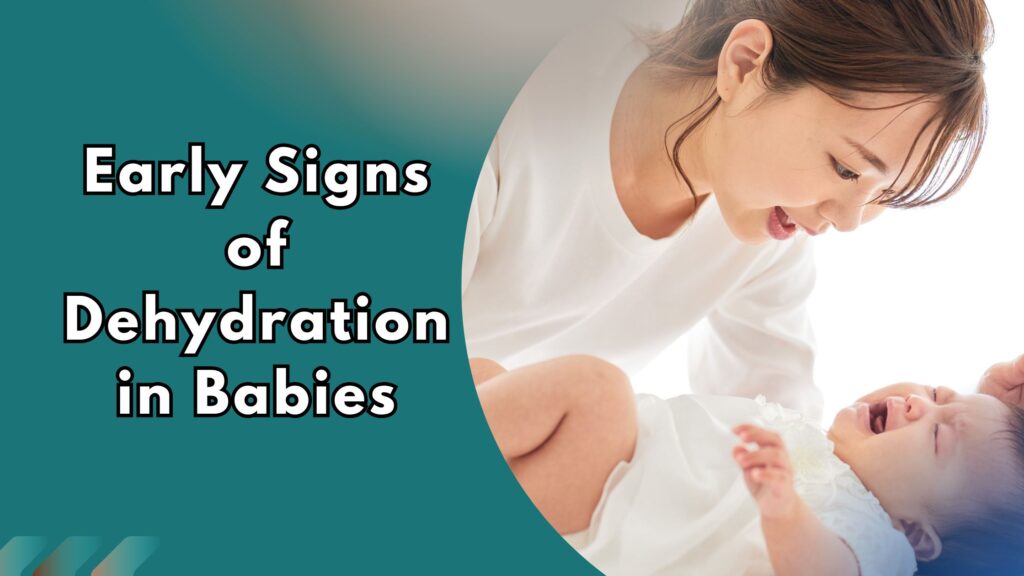
What are the Early Signs of Dehydration in Babies?
Your little one can’t tell you when they’re thirsty, but there are subtle infant dehydration symptoms to watch for:
- No wet diapers for several hours: Babies normally urinate frequently. Fewer wet diapers than usual can indicate baby dehydration. Newborns typically have at least four to six wet diapers a day.
- Crying often or appearing fussier than usual: Irritability is an early sign of dehydration in babies. When babies are dehydrated, they may feel uncomfortable and more difficult to soothe than normal.
- Dry or tearless crying: If your baby is crying but you do not see tears, it can indicate low fluid levels. Tearless crying is especially noticeable in infants who usually produce tears.
- Dry or chapped lips: Lips that are dry, cracked, or sticky are a simple visual clue that your baby may need more fluids.
- Sticky or dry mouth: A lack of saliva or a sticky feeling inside the mouth is another infant dehydration symptom.
Recognizing these signs early can make a huge difference in preventing baby dehydration from becoming serious.
Related: 10 Gentle Workouts for New Moms!
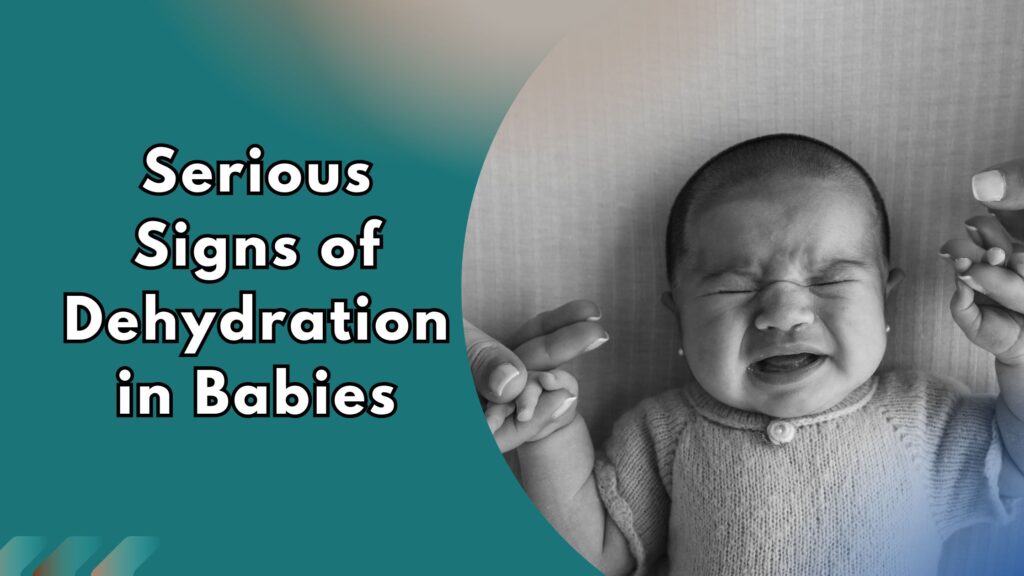
What are the Serious Signs of Dehydration in Babies?
While signs like fewer wet diapers or tearless crying can often be managed at home, there are certain warning signs that are more serious. If you notice any of the following, it is important to contact a doctor immediately:
- Sunken soft spot on the baby’s head: The soft spot (fontanelle) on a baby’s head may look sunken when fluid levels are very low. This is a serious sign of dehydration.
- Very few or no wet diapers for many hours: Going long periods without urinating means the body is holding onto fluids, which can quickly become dangerous.
- Extreme drowsiness or difficulty waking: Unusual sleepiness or weakness is a serious symptom of infant dehydration.
- Rapid heartbeat or fast breathing: Dehydration can put extra strain on a baby’s heart and lungs, leading to noticeable changes in heartbeat or breathing rate.
- Cold hands and feet: Poor circulation due to low fluid levels can make the extremities feel cold to the touch.
- Persistent vomiting or diarrhea: Continuous fluid loss through vomiting or diarrhea can quickly worsen dehydration and requires medical attention.
- Dry, pale, or mottled skin: The skin may lose its normal color or feel cool and patchy in severe dehydration.
Recognizing these signs early can make a huge difference. Don’t hesitate to seek medical care; this is exactly when to see a doctor for baby dehydration.
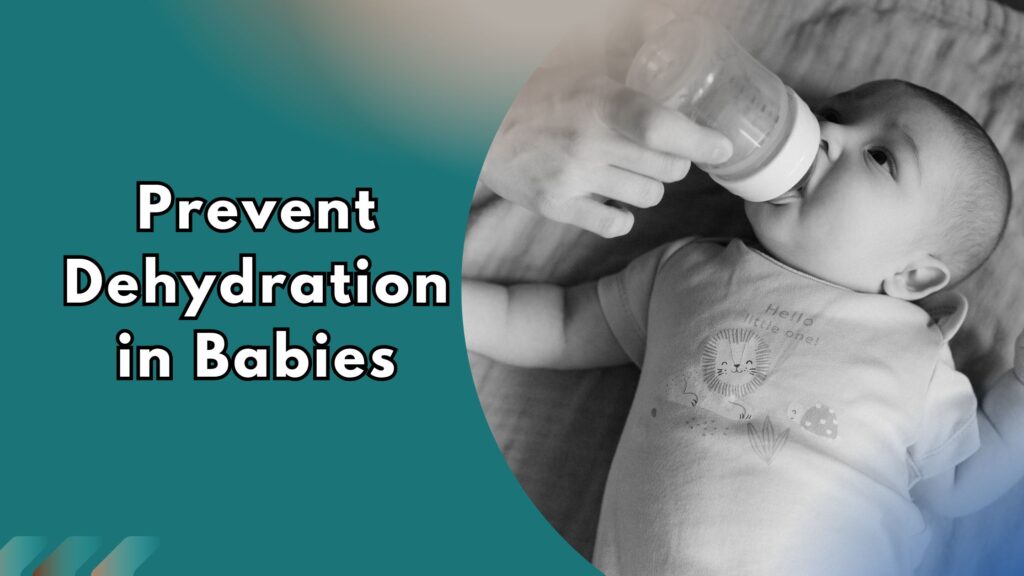
What can parents do to prevent Dehydration in Babies?
Keeping an eye on your baby regularly is key. Check every few hours for signs of dehydration in babies, such as tearless crying, a sticky or dry mouth, or unusual fussiness. Make sure to feed your baby milk or any liquids recommended by your doctor, and stick to a consistent feeding schedule. When your baby is sick, this is an especially important time to offer extra fluids. In hot weather, babies may need more frequent feeds to make up for fluid lost through sweat.
Pay attention to your baby’s environment and comfort as well. Dress them appropriately for the season and make sure they are neither too hot nor too cold. Monitor the room temperature, track how often they are urinating, and note when they last had milk or any fluids. If your baby is taking medication, check with your doctor to see if they need extra fluids during that time. These steps can help prevent baby dehydration and support overall baby healthcare.
And as they say, prevention is always better than cure, so being observant, proactive, and consistent can make a big difference in keeping your baby hydrated and healthy.
Keep Your Baby Hydrated!
Keeping your baby hydrated can be easier with a few simple habits. Here are some DIY ways to stay on track:
- Set alarms for feeding
- Frequent diaper checks
- Keep fluids ready
- Spot color changes on mouth, lips, and body
- Set an appropriate room temperature
- Dress your baby according to the weather
By staying observant and following these simple habits, you can make a big difference in keeping your baby hydrated and healthy. Regular feeds, frequent diaper checks, and having fluids ready might seem small, but they go a long way in preventing baby dehydration and ensuring proper rehydration for infants. With a little consistency and attention, you can feel confident that your baby is getting the care they need, while making everyday routines easier for both of you.

